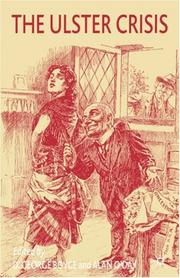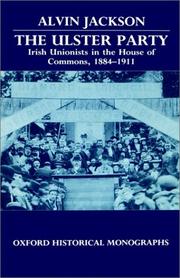| Listing 1 - 6 of 6 |
Sort by
|
Book
ISBN: 9780191835889 9780198794387 Year: 2019 Publisher: Oxford : Oxford University Press
Abstract | Keywords | Export | Availability | Bookmark
 Loading...
Loading...Choose an application
- Reference Manager
- EndNote
- RefWorks (Direct export to RefWorks)
This book undertakes the first detailed membership study of the Ulster Unionist Party (UUP). The UUP was the dominant political party in Northern Ireland during the twentieth century, but since the 1998 Belfast Agreement, the UUP has struggled to retain the loyalty and affection of many within the majority Protestant-Unionist-British community. The Belfast Agreement was internationally lauded, the UUP leader David Trimble feted with a Nobel Peace Prize.The Agreement largely produced by the UUP established power-sharing between unionists and nationalists. Yet many unionists abandoned the UUP. Many defectors, angered by UUP concessions of paramilitary prisoner releases, policing changes, and ‘terrorists’ in government, wanted a more robust defender of unionist interests. Having switched to the one-time ferociously religious and militant DUP, they have not returned to the UUP. This book analyses these developments and the current state of the Party, particularly through the prism of its (still sizeable) membership. It draws upon the first-ever quantitative study of those members, examining who they are; how and why they joined; why they have stayed loyal to their party; how they view those who defected and where the UUP is heading. The volume also uses a wide range of interviews with members at all levels of the Party and with its five most recent leaders, to analyse views on the UUP’s electoral and political difficulties and how they might be reversed. The book draws upon historical, political, and sociological perspectives in analysing the identities of UUP members and their perceptions of a wide range of contemporary issues, covering political institutions, other parties, social change, moral issues, religion, and voting.
Book
ISBN: 0192513192 0191835889 0192513184 Year: 2019 Publisher: Oxford : Oxford University Press,
Abstract | Keywords | Export | Availability | Bookmark
 Loading...
Loading...Choose an application
- Reference Manager
- EndNote
- RefWorks (Direct export to RefWorks)
Having helped produce the Belfast/Good Friday Agreement, the Ulster Unionist Party (UUP) struggled to deliver the deal amid unease over aspects of what its leadership negotiated. Paramilitary prisoner releases, policing changes, and power-sharing with the republican 'enemy' were all controversial. As the UUP leader won a Nobel Peace Prize, his party began to lost elections. For the UUP leadership, acceptance of change was the right thing to do for Northern Ireland. The decades since the peace agreement have seen the UUP eclipsed by the rival Democratic Unionist Party (DUP) even though most of what the UUP agreed in 1998 has remained in place. This text examines the travails of the UUP in recent times. It draws upon the first-ever survey of UUP members and a wide range of interviews, to analyse the reasons for its reverses and the capacity to revive.

ISBN: 1403943702 9781403943705 9781403943699 1403943699 Year: 2006 Publisher: Basingstoke ; New York Palgrave Macmillan
Abstract | Keywords | Export | Availability | Bookmark
 Loading...
Loading...Choose an application
- Reference Manager
- EndNote
- RefWorks (Direct export to RefWorks)
Home rule (Ierland) --- Home rule (Ireland) --- Home rule (Irlande) --- Unionism (Irish politics) --- Irish question --- Ireland --- Ulster (Northern Ireland and Ireland) --- Politics and government --- History --- Ulster Unionist Party --- Ireland - Politics and government - 1910-1921 --- Ireland - Politics and government - 1901-1910 --- Ireland - History - 1910-1921 --- Ireland - History - 1901-1910 --- Ulster (Northern Ireland and Ireland) - History

ISBN: 0198222882 Year: 1989 Publisher: Oxford Clarendon
Abstract | Keywords | Export | Availability | Bookmark
 Loading...
Loading...Choose an application
- Reference Manager
- EndNote
- RefWorks (Direct export to RefWorks)
Irish question --- Unionism (Irish politics) --- Loyalism (Irish politics) --- Loyalist movement (Irish politics) --- Unionist movement (Irish politics) --- Home rule --- Ulster Unionist Party --- -Great Britain. Parliament. House of Commons --- -Ulster Party --- History --- Ireland --- Northern Ireland --- Irish Free State --- Politics and government --- -Politics and government --- -Politics and government. --- -History --- Great Britain. --- Ulster Party --- House of Commons (Great Britain) --- England and Wales. --- History. --- Politics and government.
Book
ISBN: 0191876860 0192578340 0192578359 Year: 2020 Publisher: Oxford, England : Oxford University Press,
Abstract | Keywords | Export | Availability | Bookmark
 Loading...
Loading...Choose an application
- Reference Manager
- EndNote
- RefWorks (Direct export to RefWorks)
'Negotiating a Settlement in Northern Ireland' uses original material from witness seminars, elite interviews, and archive documents to explore the shape taken by the Irish peace process, and in particular to analyse the manner in which successful stages of this were negotiated. Northern Ireland's Good Friday Agreement of 1998 marked the end a 30-year conflict that had witnessed more than 3,000 deaths, thousands of injuries, catastrophic societal damage, and large-scale economic dislocation. This book traces the roots of the Agreement over the decades, stretching back to the Sunningdale conference of 1973 and extending up to at least the St Andrews Agreement of 2006.
Violence --- Conflict management --- Peace-building --- Northern Ireland --- Politics and government. --- Building peace --- Peacebuilding --- Peace --- Peacekeeping forces --- Conflict control --- Conflict resolution --- Dispute settlement --- Management of conflict --- Managing conflict --- Management --- Negotiation --- Problem solving --- Social conflict --- Crisis management --- Sinn Fein --- Ulster Unionist Party --- Ulster Party --- Shin Feĭn --- SF --- Ċoṁairle Náisiúnta (Ireland) --- National Council (Ireland) --- Chomhairle Naisiunta (Ireland) --- Sinn Fein the Workers' Party --- History --- Great Britain --- Ireland --- Irish Free State --- G.N.I. --- GNI --- Irlande du Nord --- Kita Airurando --- Kitairurando --- Nordirland --- Norlin Airlann --- Pohjois-Irlanti --- Severna Irlandii︠a︡ --- Tuaisceart Éireann --- 北アイルランド --- Politics and government --- Foreign relations --- Peace negotiations --- Politicians --- Statesmen
Book
ISBN: 1526102781 1781706085 9781781706084 9781526102782 9780719082061 0719082064 1526122839 152610279X Year: 2013 Publisher: Manchester New York
Abstract | Keywords | Export | Availability | Bookmark
 Loading...
Loading...Choose an application
- Reference Manager
- EndNote
- RefWorks (Direct export to RefWorks)
Combining the latest scholarship and academic research with current debates, 'Direct Democracy' is essential reading for political scientists, lawyers, journalists and anybody who is interested in the challenges facing democracies today. It shows when government by the people can improve democratic governance.
Direct democracy. --- Referendum. --- Comparative government. --- Comparative political systems --- Comparative politics --- Government, Comparative --- Political systems, Comparative --- Political science --- Ballot initiatives --- Ballot measures --- Initiative and referendum --- Initiatives, Ballot --- Propositions (Referendum) --- Referenda --- Referendums --- Democracy --- Elections --- Representative government and representation --- Direct democracy --- Plebiscite --- Direct legislation --- Referendum --- Great Britain. --- Democratic Unionist Party (Northern Ireland) --- Sinn Fein. --- Social Democratic and Labour Party (Northern Ireland) --- Ulster Unionist Party. --- Northern Ireland Act 1998 (Great Britain) --- Since 1994 --- Northern Ireland --- Northern Ireland. --- Politics and government --- Ulster Party --- SDLP --- Chomhairle Naisiunta (Ireland) --- Ċoṁairle Náisiúnta (Ireland) --- National Council (Ireland) --- SF --- Shin Feĭn --- Sinn Fein the Workers' Party --- DUP --- Ulster Democratic Unionist Party --- D.U.P.N.I. --- Act to make new provision for the government of Northern Ireland for the purpose of implementing the agreement reached at multi-party talks on Northern Ireland set out in Command Paper 3883 (Great Britain) --- G.N.I. --- GNI --- Irlande du Nord --- Kita Airurando --- Kitairurando --- Nordirland --- Norlin Airlann --- Pohjois-Irlanti --- Severna Irlandii͡ --- Tuaisceart Éireann --- Direct Democracy. --- The Legislative Initiative. --- The Recall.
| Listing 1 - 6 of 6 |
Sort by
|

 Search
Search Feedback
Feedback About UniCat
About UniCat  Help
Help News
News